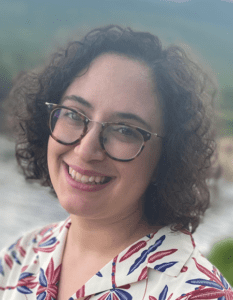Posted By: HGG Advances
Each month, the editors of Human Genetics and Genomics Advances interview an early-career researcher who has published work in the journal. This month we check in with Rebecca Meyer Schuman (@RMeyerSchuman) to discuss her paper “A model organism pipeline provides insight into the clinical heterogeneity of TARS1 loss-of-function variants.”

HGGA: What motivated you to start working on this project?
RMS: The traditional approach to using model organisms is to introduce disease-associated variants and test for disease mechanisms. We wanted to try to flip this paradigm around, using what we knew about the properties of pathogenic aminoacyl-tRNA synthetase (ARS) variants to predict the pathogenicity of a new variant in a new ARS gene (TARS1). In fact, while I was working on this project, patients were found with recessive TARS1-mediated disease! This was a great proof-of-principle that our approach could work in tandem with human genetics.
HGGA: What about this paper/project most excites you?
RMS: Our TARS1 mouse had an intriguing set of phenotypes that were reminiscent of the ARS patient populations in some respects, but totally different in others. Understanding the biology underpinning the similarities and differences of the ARS diseases is a big, exciting challenge for the field. Hopefully, it will lead us to a better understanding of disease mechanisms and possible therapeutic opportunities.
HGGA: What do you hope is the impact of this work for the human genetics community?
RMS: I hope this project demonstrates the feasibility and relevance of using a pipeline of model organisms (including yeast, worms, and mice) to proactively implicate new variants in disease phenotypes. Especially for ultra-rare diseases with small patient populations, this type of work will hopefully provide context for clinical diagnostics and patient care, and ultimately yield new biological insights to inform treatment.
HGGA: What are some of the biggest challenges you’ve faced as a young scientist?
RMS: As a trainee, it can be easy to become discouraged when I hit experimental roadblocks, or when hypotheses don’t work out the way I hoped. I’m always reminding myself that my ultimate goal is to do clean and careful science, not to prove my hypothesis correct.
HGGA: And for fun, what is one of the most fascinating things in genetics you’ve learned about in the past year or so?
RMS: We inherit our mitochondrial DNA from our mothers because, according to a recent study, sperm cells don’t have mitochondrial DNA.
Rebecca Meyer Schuman, PhD is a postdoctoral fellow at Baylor College of Medicine.
